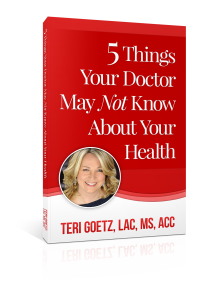Find the Cause. Treat the Root. Heal Yourself.
FAQ

So what IS Traditional Chinese Medicine and Integrative Medicine?
TCM is a system of primary health care that encompasses many different practices, including acupuncture, moxibustion (burning an herb above the skin to apply heat to acupuncture points), Chinese herbal medicine, tui na (Chinese therapeutic massage), and dietary therapy. It is rooted in the ancient philosophy of Taoism and has been practiced and evolved for thousands of years. Traditional systems of medicine also exist in other East and South Asian countries, including Japan and Korea. France also has a long history of using acupuncture and TCM.
In the U.S., practitioners are given a rigorous, 4 year program of study, which teaches both Eastern and Western medicine. Students also do an internship under the supervision of an experienced practitioner.

TCM, Integrative and Functional Medicine
TCM is based on the harmony between two opposing yet complementary forces, called yin and yang, which support health. Disease results from an imbalance between these forces. Qi (pronounced “chee) is the vital energy that flows through the body which performs multiple functions in maintaining health.
While this may sound esoteric, it is sound theory. In some ways, TCM is its own paradigm and can’t be translated into western medical terms, but in other ways, we see a correlation.
Acupuncture is the use of very fine, non-hollow needles inserted into points on the “meridians”— the highway system of qi that runs throughout the body. Needles may be electrically stimulated, or manipulated manually. There is generally very little pain associated with acupuncture as the needles are very fine and flexible, unlike a hollow hypodermic needle.
Integrative medicine brings practitioner and patient together into a partnership which sees the person, not the disease. The beauty of both TCM and the concept of integrative medicine is that the whole person is treated in both — and all body systems are considered part of the whole. When one part of the system breaks down, the whole body may experience repercussions. How these systems interact is key to finding the root cause of dis-ease.
Functional medicine is interestingly similar in concept to Chinese medicine. In functional medicine, we look for the root cause of your condition, just like in TCM. It is a western, comprehensive view of body systems. I studied with the Institute for Functional Medicine. While NYS does not allow acupuncturists to order labs (but we can in other states!) I still take the information presented in an assessment and cross reference it with Chinese and Functional medicine — creating a unique and integrative approach. You won’t find many acupuncturists who have studied this level of functional and integrative medicine.
Chinese herbal medicine. The Chinese Materia Medica (a pharmacological reference book used by TCM practitioners) describes thousands of medicinal substances—primarily plants, but also some minerals and animal products. Different parts of plants, such as the leaves, roots, stems, flowers, and seeds, are used. In TCM, herbs are often combined in formulas and given as teas, capsules, liquid extracts, granules, or powders. These formulae help balance the body and are more synergistic than an individual botanical or pharmaceutical…although sometimes these are used adjunctively, as well.
TCM takes a holistic approach to understanding normal function and disease processes and focuses as much on the prevention of illness as it does on the treatment.
Western medicine uses pharmaceuticals, often with side effects, to relieve symptoms…and we are very grateful for these at times. However, the problem is that it is too often a “Band-Aid” and masks the symptoms but doesn’t provide a cure. Instead, it makes more sense to do both—provide relief for symptoms while treating the cause of the symptoms, which is what Chinese and western herbal medicine can do. This can also be integrated with other supplements, as well.

What is qi & how does it affect the body?
When we are healthy, an abundant supply of qi (pronounced chee) or “life energy” flows through the body’s meridians (a network of unseen channels through the body). If the flow of qi in the meridians becomes blocked or there is an inadequate supply of qi, then the body fails to maintain harmony, balance and order, and disease or illness follows. This can result from stress, overwork, poor diet, disease pathogens, weather, environmental conditions, and other lifestyle factors, and becomes evident to TCM practitioners through identifiable signs of body dysfunction. TCM practitioners look carefully for these signs of health and dysfunction, paying particular attention to not only the presenting condition, but also the medical history, general constitution, and the pulse and tongue.

TCM treatment decision making
Clinical assessment, diagnosis, and treatment principles are based on the theoretical frameworks of TCM which seek to identify underlying symptom patterns that indicate how the body is or has become dysfunctional. Treatment is focused on the underlying condition as well as the presenting symptoms. Clinical decision-making and patient management strategies are also influenced by contemporary Western approaches to health care, including infection control practices and known interactions of herbal medicines with pharmaceuticals and other therapeutic substances.
TCM treatments work on the basis of individualized formulae for each patient. For more details, refer to the sections on acupuncture and Chinese herbal medicine.

Is it safe?
Acupuncture is considered safe when performed by an experienced practitioner using sterile needles. Needles must be sterile, used once and disposed of properly, of course.

Is it enjoyable?
I can’t tell you the number of times people have gotten off my table only to say, “Wow. I feel amazing!” Acupuncture is an incredibly relaxing modality! When you are truly in balance, the feeling is magical.

